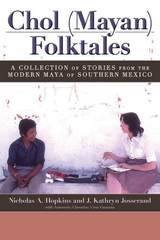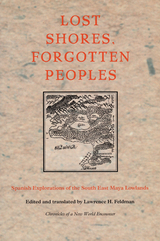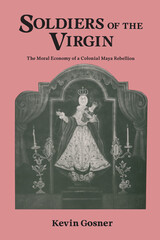3 books about Chol Indians

Chol (Mayan) Folktales
A Collection of Stories from the Modern Maya of Southern Mexico
Nicholas A. Hopkins
University Press of Colorado, 2016
Chol (Mayan) Folktales deftly combines high-quality and thoughtfully edited transcriptions of oral storytelling with translation and narrative analysis, documenting and analyzing a trove of Chol folklore. The work provides a look into the folktale culture of the contemporary Maya presented with a rare and innovative theoretical framework.
The rich Chol oral narrative tradition is represented by eleven stories, each printed in the original language of the storytellers with parallel English translations and accompanied by a brief introduction that provides the relevant cultural and mythological background. Included with eight of the stories is a link to an audio clip of the tale told aloud in the Chol language. In addition, Chol (Mayan) Folktales introduces a model for the analysis of narratives that can be used to demonstrate the existence of a tradition of storytelling applicable to other Maya lore, including Classic period hieroglyphic texts.
Creating a nuanced sense of the Mayan oral tradition and revealing a highly structured literary style, this collection provides insight into contemporary Maya culture as well as a greater understanding of Classic period society. It will be of interest to students and scholars of folklore and literature and to anthropologists and linguists.
The rich Chol oral narrative tradition is represented by eleven stories, each printed in the original language of the storytellers with parallel English translations and accompanied by a brief introduction that provides the relevant cultural and mythological background. Included with eight of the stories is a link to an audio clip of the tale told aloud in the Chol language. In addition, Chol (Mayan) Folktales introduces a model for the analysis of narratives that can be used to demonstrate the existence of a tradition of storytelling applicable to other Maya lore, including Classic period hieroglyphic texts.
Creating a nuanced sense of the Mayan oral tradition and revealing a highly structured literary style, this collection provides insight into contemporary Maya culture as well as a greater understanding of Classic period society. It will be of interest to students and scholars of folklore and literature and to anthropologists and linguists.
[more]

Lost Shores, Forgotten Peoples
Spanish Explorations of the South East Maya Lowlands
Lawrence H. Feldman, ed. and translator
Duke University Press, 2000
Long after the Aztecs and the Incas had become a fading memory, a Maya civilization still thrived in the interior of Central America. Lost Shores, Forgotten Peoples is the first collection and translation of important seventeenth-century narratives about Europeans travelling across the great “Ocean Sea” and encountering a people who had maintained an independent existence in the lowlands of Guatemala and Belize.
In these narratives—primary documents written by missionaries and conquistadors—vivid details of these little known Mayan cultures are revealed, answering how and why lowlanders were able to evade Spanish conquest while similar civilizations could not. Fascinating tales of the journey from Europe are included, involving unknown islands, lost pilots, life aboard a galleon fleet, political intrigue, cannibals, and breathtaking natural beauty. In short, these forgotten manuscripts—translations of the papers of the past—provide an unforgettable look at an understudied chapter in the age of exploration.
Lost Shores, Forgotten Peoples will appeal to archaeologists, anthropologists, and historians interested in Central America, the Maya, and the Spanish Conquest.
In these narratives—primary documents written by missionaries and conquistadors—vivid details of these little known Mayan cultures are revealed, answering how and why lowlanders were able to evade Spanish conquest while similar civilizations could not. Fascinating tales of the journey from Europe are included, involving unknown islands, lost pilots, life aboard a galleon fleet, political intrigue, cannibals, and breathtaking natural beauty. In short, these forgotten manuscripts—translations of the papers of the past—provide an unforgettable look at an understudied chapter in the age of exploration.
Lost Shores, Forgotten Peoples will appeal to archaeologists, anthropologists, and historians interested in Central America, the Maya, and the Spanish Conquest.
[more]

Soldiers of the Virgin
The Moral Economy of a Colonial Maya Rebellion
Kevin Gosner
University of Arizona Press, 1992
In the early summer of 1712, a young Maya woman from the village of Cancuc in southern Mexico encountered an apparition of the Virgin Mary while walking in the forest. The miracle soon attracted Indian pilgrims from pueblos throughout the highlands of Chiapas. When alarmed Spanish authorities stepped in to put a stop to the burgeoning cult, they ignited a full-scale rebellion. Declaring "Now there is no God or King," rebel leaders raised an army of some five thousand "soldiers of the Virgin" to defend their new faith and cast off colonial rule.Using the trial records of Mayas imprisoned after the rebellion, as well as the letters of Dominican priests, the local bishop, and Spaniards who led the army of pacification, Kevin Gosner reconstructs the history of the Tzeltal Revolt and examines its causes. He characterizes the rebellion as a defense of the Maya moral economy, and shows how administrative reforms and new economic demands imposed by colonial authorities at the end of the seventeenth century challenged Maya norms about the ritual obligations of community leaders, the need for reciprocity in political affairs, and the supernatural origins of power.The first book-length study of the Tzeltal Revolt, Soldiers of the Virgin goes beyond the conventions of the regional monograph to offer an expansive view of Maya social and cultural history. With an eye to the contributions of archaeologists and ethnographers, Gosner explores many issues that are central to Maya studies, including the origins of the civil-religious hierarchy, the role of shamanism in political culture, the social dynamics of peasant corporate communities, and the fate of the native nobility after the Spanish conquest.
[more]
READERS
Browse our collection.
PUBLISHERS
See BiblioVault's publisher services.
STUDENT SERVICES
Files for college accessibility offices.
UChicago Accessibility Resources
home | accessibility | search | about | contact us
BiblioVault ® 2001 - 2024
The University of Chicago Press









